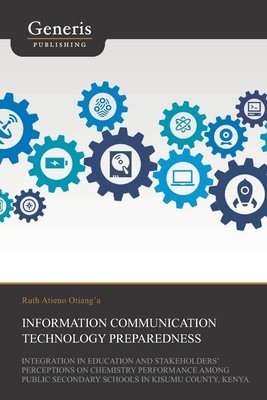
- We will send in 10–14 business days.
- Author: Ruth Otianga
- Publisher: Generis Publishing
- ISBN-10: 997515381X
- ISBN-13: 9789975153812
- Format: 15.2 x 22.9 x 1.1 cm, minkšti viršeliai
- Language: English
- SAVE -10% with code: EXTRA
Information Communication Technology Preparedness, Integration in Education and Stakeholders' Perceptions on Chemistry Performance Among Public Secondary Schools in Kisumu County, Kenya (e-book) (used book) | bookbook.eu
Reviews
Description
Information Communication Technology (ICT) integration is embraced in education to improve quality of learning and performance globally. In 2006, under its national ICT policy, the Ministry of Education in Kenya encouraged ICT integration in education using even basic infrastructure including mobile phones and Internet. Chemistry is expected to benefit more because the versatile ICT tools concretize concepts and enhance learning of its abstract content. Objectives of this study were to establish: availability of ICT resources; Chemistry teachers' capacity to integrate ICT in pedagogy; the extent of integration of ICT and assess stakeholders' perceptions of ICT integration on learner performance in Chemistry. The study population was 122 Chemistry teachers, 61 school principals, 5,962 Form 4 Chemistry students from 61 public secondary schools with computers and 7 Sub-county Quality Assurance and Standards Officers (SQASO) in Kisumu County. Data collection instruments were Questionnaires, Observation Schedule and Lesson Observation Checklist. Quantitative analysis of data was done using descriptive statistics that included frequency counts, percentages, means and standard deviations, while qualitative data was analyzed thematically. Findings indicate that ICT resources, only available at the ICT centers, are not adequate for integration in chemistry pedagogy; all Chemistry teachers are IT literate but seldom perform tasks in lesson preparation or in pedagogy with ICT; ICT enhanced environment does not exist in Kenyan classrooms as only 24.5% of learners have experienced some form of ICT integration in their chemistry lessons; and, stakeholders have positive perceptions that ICT integration improves performance but seldom use it in pedagogy. The study concluded that traditional methods still dominate Kenyan education system; and recommends that the Ministry of Education considers funding ICT resources in schools; teachers should train on technological integration; all schools should have websites and go digital with all their pedagogical activities.
EXTRA 10 % discount with code: EXTRA
The promotion ends in 21d.20:26:02
The discount code is valid when purchasing from 10 €. Discounts do not stack.
- Author: Ruth Otianga
- Publisher: Generis Publishing
- ISBN-10: 997515381X
- ISBN-13: 9789975153812
- Format: 15.2 x 22.9 x 1.1 cm, minkšti viršeliai
- Language: English English
Information Communication Technology (ICT) integration is embraced in education to improve quality of learning and performance globally. In 2006, under its national ICT policy, the Ministry of Education in Kenya encouraged ICT integration in education using even basic infrastructure including mobile phones and Internet. Chemistry is expected to benefit more because the versatile ICT tools concretize concepts and enhance learning of its abstract content. Objectives of this study were to establish: availability of ICT resources; Chemistry teachers' capacity to integrate ICT in pedagogy; the extent of integration of ICT and assess stakeholders' perceptions of ICT integration on learner performance in Chemistry. The study population was 122 Chemistry teachers, 61 school principals, 5,962 Form 4 Chemistry students from 61 public secondary schools with computers and 7 Sub-county Quality Assurance and Standards Officers (SQASO) in Kisumu County. Data collection instruments were Questionnaires, Observation Schedule and Lesson Observation Checklist. Quantitative analysis of data was done using descriptive statistics that included frequency counts, percentages, means and standard deviations, while qualitative data was analyzed thematically. Findings indicate that ICT resources, only available at the ICT centers, are not adequate for integration in chemistry pedagogy; all Chemistry teachers are IT literate but seldom perform tasks in lesson preparation or in pedagogy with ICT; ICT enhanced environment does not exist in Kenyan classrooms as only 24.5% of learners have experienced some form of ICT integration in their chemistry lessons; and, stakeholders have positive perceptions that ICT integration improves performance but seldom use it in pedagogy. The study concluded that traditional methods still dominate Kenyan education system; and recommends that the Ministry of Education considers funding ICT resources in schools; teachers should train on technological integration; all schools should have websites and go digital with all their pedagogical activities.


Reviews